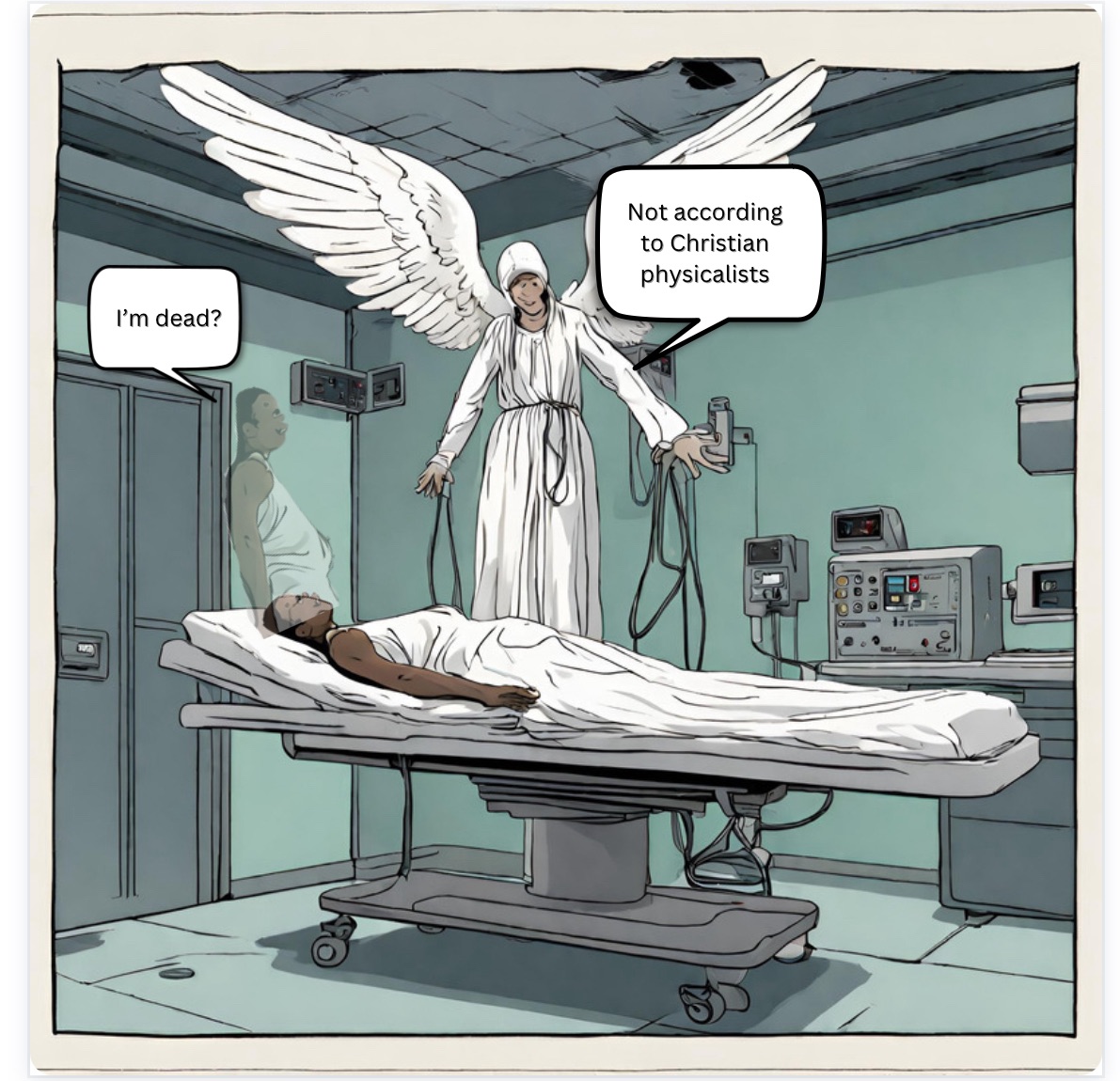Substance Dualism is the view that humans are body/soul composites in contrast to physicalism which asserts that humans are merely physical entities through and through, and that when the body dies, it’s a cessation of consciousness and existence for the person who died. Unlike atheists, Christian physicalists believe that consciousness will be eventually be returned to people at the bodily resurrection [1]Most Christian physicalists are annihilationists, so they believe consciousness will be permanently returned to those who have placed their faith in Jesus Christ, however, it will only be temporarily … Continue reading, but until then, they experience nothing. I have written on the biblical and philosophical problems with dualism in other articles. In this article, however, I will be on the defensive rather than the offensive.
One thing I repeatedly run into when discussing dualism with physicalists (Who are mostly annihilationists like myself) is this; dualism entails that people don’t really die. After all, on dualism, people are still conscious, are they not? Those in the intermediate state can interact with God and each other. So, the argument goes, that if a person continues to exist in a state of consciousness after the deaths of their bodies, then they are technically still alive. Since it is absurd to say there is no death here in this fallen world (as even The Bible affirms that people die in places like Genesis 3:19 and Romans 5), then dualism must be rejected. This type of argumentation is known in philosophy as a reductio ad absurdum.
Answer 1: Death Is A Type Of Destruction
What should we Christians who hold to a form of dualism say in response to this? Here are my thoughts; death always entails some sort of destruction. Why do people die? Because their bodies fail them. Whether it be by cancer, a horrible car accident, a gun shot wound, or have you. These things cause a person’s body to become so badly damaged that they cannot continue to sustain vital functions. It’s at that point that the soul leaves the body. There is no reason to think that death has to mean the cessation of consciousness. We can think of death from a dualist perspective as a partial destruction. At least it is the first time around. The second time around for the unredeemed, it will be a complete and total destruction. For the non-Christians who experience the second death (Revelation 20:13-15), the lack of consciousness will be a byproduct of there not being anything left of the person. There won’t be a physical brain nor an immaterial mind to experience consciousness. This is exactly what Jesus says in Matthew 10:28; “Do not be afraid of those who can kill the body, but rather fear him who can destroy BOTH body AND soul in Hell.” (Emphasis mine)
I have a theory that most of my annihilationist brothers in Christ are so dogmatic about Christian physicalism because they think it makes annihilationism tougher to defend. So many defenders of the traditional view of Hell try to define death as “separation”. Physical death is a separation of the body from the soul, they say, so Hell is a death too. It’s eternal separation from God. However, I don’t think dualism helps the eternal torment advocate. Matthew 10:28 is the best text to get around those who try to make death all about “separation”. No, it’s total destruction. In Hell, God will destroy BOTH body AND soul. And if people are body/soul composites, and both the body and the soul are destroyed, there is nothing left of the person. That’s annihilation.
Answer 2: Death Is Cessation Of Either Biological And/Or All Consciousness
Moreover, even we were to concede that death is a cessation of consciousness, there is a way for the dualist to accommodate this. One could say that death is the cessation of BODILY consciousness, but that the soul continues to live on. Of course, again, this wouldn’t be indefinitely for the unredeemed, but I am prone to see Luke 16:19-31 as an actual setting. I am not, however, inclined to see this as something that actually happened between actual persons. When I say that I’m inclined to see it as an actual setting, I mean this in the same sense that I am inclined to believe in the existence of vineyards and inns. In Jesus’ parables, although they involve fictitious people and events, they are nevertheless set in real places with real first century customs. Jesus never makes up non-real places or bizarre things that have no correspondence to reality as the backdrop for his fictional stories. There are vineyards and vineyard owners. Farmers do plant seeds. There is such a thing as pearls and mustard seeds. Therefore, although the story of The Rich Man and Lazarus is likely a parable, I don’t think that warrants saying that we can’t draw any theology of the intermediate state from it. Anyway, with that little excursus over, allow me to continue. Whatever postmortem consciousness the unredeemed experience will be temporary. On judgment day, they will die the death of body and soul. They will experience the second death. And when they do, not only will neurological consciousness cease, but so will any consciousness the soul would experience as well. Because, again, the soul and the body are destroyed in Hell (see Matthew 10:28).
Answer 3: Death Is The End Of Life, Physical Or Otherwise
A third way to view death is as the end of life, physical or otherwise. In fact, death has been used in scripture to mean the end of several things, such as the end of relationships (Luke 15:24) and the end of living a sinful lifestyle (Romans 8:13). Death can be said to be the end of a person’s biological life.
Conclusion
I have never characterized death as separation even back when I affirmed the eternal torment view of Hell! Maybe that’s one reason why it was so easy for me to change sides? A person’s body dies at death, but their souls live on. Death is a destruction. Or as one of my fellow dualist contitionalists put it, “death is the end of life, biological or otherwise.” [2]I can’t remember who said this though. We could speak of death as being a partial death. “He’s only mostly dead” to quote The Princess Bride. But for those not in Christ, they will be destroyed completely and utterly. We know what the first death was; the first death is cessation of consciousness (of the brain), or destruction (of the body), or the end of a person in one sense. For the second death to be the second death, it must be like the first in at least that way. On the eternal torment view that the type of death those in Hell experience is just a separation from God, (1) unbelievers have always been relationally separated from God, so I’m not sure what exactly changes on judgment day. (2) If this hasn’t happened before, then it isn’t really the second death. Whatever it is, it’s the first of its kind. The second death is best explained as the complete and utter death of a person! The entire cessation of their being! [3]I highly recommend checking out Chris Date’s article titled “Traditionalism and The (Not So) Second Death” on the Rethinking Hell website. –> … Continue reading Not only is that a natural reading of the Revelation text, but, like I said, other scriptures can inform our understanding of that such as Matthew 10:28, John 3:16, 2 Peter 2:6.
You just don’t need to be a physicalist for annihilationism to work. You just don’t. The worst you’ll lose is some of your proof texts from the Old Testament (like Genesis 3, which seems to be God only inflicting physical death on Adam and Eve for their sin). But trust me, we annihilationists still have plenty to work with. If you’re interested, I defend the annihilationist view of Hell in my book “Yahweh’s Inferno: Why Scripture’s Teaching On Hell Doesn’t Impugn The Goodness Of God”. If you want to see how a card carrying dualist defends conditional immortality, get that book. I spend three whole chapters on it.
And dualism certainly doesn’t entail that people never die (regardless of whether you affirm eternal torment or annihilationism).
References
| ↑1 | Most Christian physicalists are annihilationists, so they believe consciousness will be permanently returned to those who have placed their faith in Jesus Christ, however, it will only be temporarily restored to non-Christians. Non-Christians will be thrown into the Lake Of Fire to experience the second death – see Revelation 20:13-15 |
|---|---|
| ↑2 | I can’t remember who said this though. |
| ↑3 | I highly recommend checking out Chris Date’s article titled “Traditionalism and The (Not So) Second Death” on the Rethinking Hell website. –> https://rethinkinghell.com/2012/09/06/traditionalism-and-the-not-so-second-death/ Date shows how the various ways that eternal torment advocates try to define The Second Death ultimately fail in making it a SECOND Death. Whatever it is, it is not the second in a series of events. |




